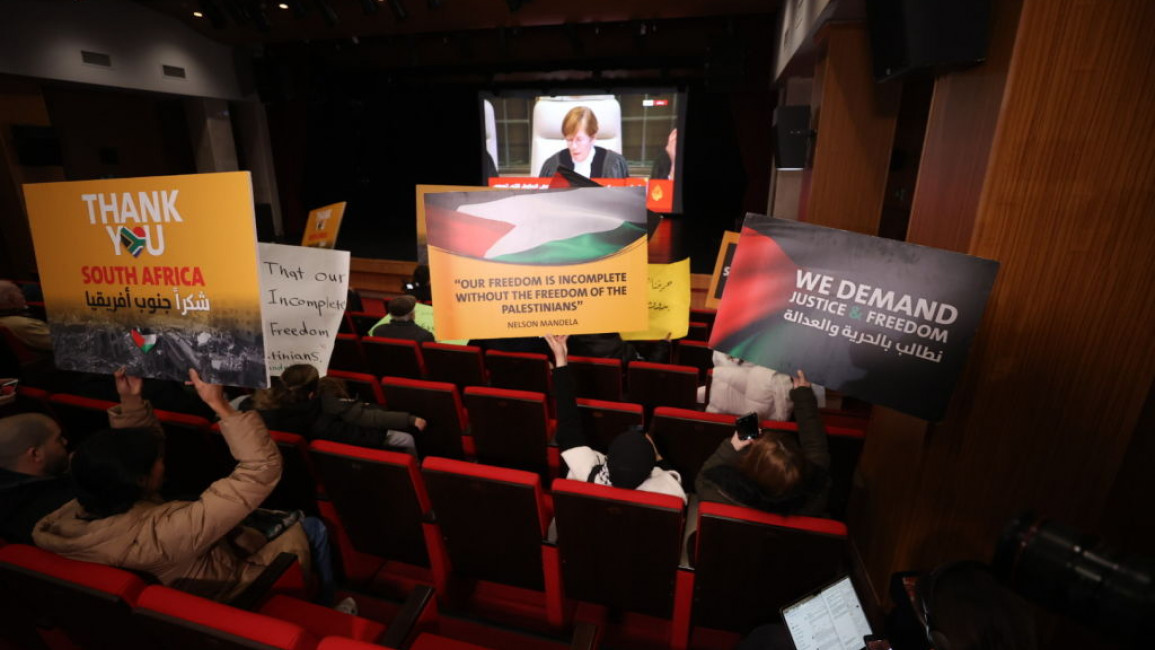ICJ ruled there are 'plausible acts of genocide' by Israel in Gaza, but stopped short of ceasefire call. What next?
The 17-judge panel of the International Court of Justice (ICJ) on Friday ruled that there exists a plausible risk that Israel's war on the Gaza Strip violates the 1948 Genocide Convention and imposed several provisional measures on Tel Aviv.
However, the court did not rule to order an immediate ceasefire in Gaza as many had hoped.
What happens next?
What were the emergency measures South Africa requested?
In December, South Africa filed an 84-page legal case at the ICJ accusing Israel of violating the 1948 Genocide Convention due to its assault on Gaza which has now entered its fourth month.
Israel said that the allegations that it was committing genocide were "grossly distorted" and a "blood libel", saying its war in Gaza was in "self-defence".
On 11 and 12 January, the ICJ conducted public hearings during which South Africa presented its case on genocide in Gaza, and Israel countered it.
South Africa asked the ICJ to order nine provisional measures to cease violence in Gaza until the court makes its ruling on the case.
Among the provisional measures asked for were that Israel should suspend military operations in and against Gaza and should not escalate military operations any further.
Israel was also told to allow access to adequate food, water, fuel, shelter, hygiene and sanitation to Gaza and prevent the destruction of Palestinian life in the enclave.
The ICJ also instructed Israel not to destroy evidence relevant to South Africa's genocide allegations against it and to allow international bodies - such as fact-finding missions - to access Gaza to document evidence.
The ICJ's rulings are legally binding and cannot be appealed.
However, this isn't the first time the ICJ was brought into a case regarding Israel. In 2004, the ICJ ruled Israel's wall built in the occupied West Bank was "illegal", but this was ignored with no pushback.
What did the court rule?
At the beginning of Friday's session, the court underscored that the rights of Palestinians exist and must be protected.
The court then brushed aside Israel's procedural arguments against the case, such as the ICJ having no jurisdiction for the case or there being no "dispute" with South Africa.
Most significantly, the ICJ court, citing UN sources, laid out a case of how it was "plausible" that Israel's war on Gaza "appear to be capable of falling within acts of genocide".
Because of this observation, the court ordered six provisional measures: Israel must take measures to prevent acts of genocide in the Gaza Strip, and must report back to the court in one month; Israel must prevent and punish incitement to genocide in Gaza; Israel must allow humanitarian aid into Gaza; and Israel must take more measures to protect Palestinians.
What does this mean?
On one hand, the ruling by the ICJ court greatly weakens arguments made by several Western states that the very accusation Israel is committing genocide was "meritless" or "baseless of fact".
Israel is now on trial at "the World's Court" on the question of whether it is committing genocide, and UN sources were used to underscore why Israel is being scrutinised on these terms.
Next will be a "merit stage" - a proceeding that will take years and involve multiple countries intervening and counter-intervening.
The date for the merit stage will be announced when four current judges are replaced in early February.
Meanwhile, there will undoubtedly be increased pressure on local, regional, and international institutions about the case, particularly within Western states that propagate the importance of a "rules-based" global order.
There are pending cases in the US, Switzerland, the International Criminal Court (ICC), and elsewhere, and they will all likely be bolstered by this ruling.
But in terms of the immediate concerns for the Palestinians in Gaza, the ICJ did not directly order a suspension of military hostilities, rather taking a more implicit action – and leaving a little wiggle room for Israel to escape extensive accountability.
To encourage Israel further, as the merit stage proceeds, the ICJ did call on Hamas to immediately and unconditionally release Israeli captives while saying nothing about Palestinian detainees held by Israel.
Notably, today's session began by emphasising "the immediate context", focusing on 7 October, without noting the overarching context of "75-year-long apartheid, its 56-year-long belligerent occupation of Palestinian territory and its 16-year-long blockade of Gaza" that South Africa noted when it launched its case.
Moreover, the decision by the ICJ to highlight the humanitarian situation in Gaza but not call for a direct end to Israel's war delays a massive test of its legitimacy and the limits of international law.
It is likely why these non-controversial provisional measures were backed by 15 or 16 votes, respectively.
It remains to be seen if Israel will follow through with any of these measures, but already both Israeli Prime Minister Benjamin Netanyahu and Defence Minister Yoav Gallant publicly rejected the court's rulings.
Gallant said: "The International Court of Justice in The Hague went above and beyond when it granted South Africa's antisemitic request to discuss the claim of genocide in Gaza, and now refuses to reject the petition outright."
It should be noted that between the two weeks of the opening session of the case and today's preliminary ruling by the ICJ, Israel has killed over 2,500 Palestinians in Gaza and the occupied West Bank.
More than 26,000 people have been killed, and 64,487 have been injured since Israel launched its war on Gaza on 7 October.



